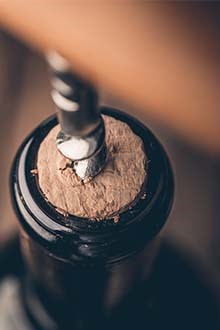How can Wine Drinkers help the Environment?
By Master of Wine, Christopher Burr
26/04/2022

I wrote recently about the impact the glass bottle has on the environment;- a 400 gram glass bottle creating a 425 grams of C02 footprint, with very heavy bottles up to 900 grams, far more. There are 30 billion bottles produced around the world every year!
I saw today that in Finland this issue is taken far more seriously, with over half wine being sold in alternative packaging to glass. The bag in box is the most used but also pouches, PET bottles and aluminium cans.
Admittedly wine is sold through the monopoly in Finland, so they are able to dictate what is sold and its packaging, but the consumer there readily accepts and embraces alternatives to glass.
Here in the UK, the consumer seems to have been kept a bit in the dark over the issues, and many believe glass is environmentally preferable as it can be recycled, unaware of weight and transport costs, or indeed the C02 emissions from re-melting down and recycling.
Whilst many wine makers are doing great things in the vineyard, use of heat pumps, solar panels and reduced treatments, some of the other big issues get forgotten.
Here in the UK, the consumer seems to have been kept a bit in the dark over the issues, and many believe glass is environmentally preferable as it can be recycled, unaware of weight and transport costs
Firstly, when I started in the industry back in the late 1960's we used to ship wine in bulk, either barrels of containers, and bottle in this country. This saved huge amounts of transporting heavy glass around the world, and the resultant impact.
UK bottling has restarted, and most bottlers do a great quality job, but how would the consumer be able to make the choice to support UK bottled wine? No bottle says it is bottled locally, all there is for an expert or someone in the wine industry to tell, is a small bottlers code on the back label. How can a consumer make a sensible choice between a New Zealand Sauvignon Blanc shipped economically and in temperature controlled tanks and bottled in the UK, or one bottled in heavy bottles in New Zealand?
Obviously my argument is not totally cut and dried, as many producers, probably understandably, keep back their best wine so they can control the bottling themselves, and things can go wrong occasionally with bulk shipments.
But the knowledge and technology is now available to be able to make the bulk shipment of the highest quality. Indeed back in the 1960's we used to argue that the best UK merchants bottlings were better than those bottled by a busy producer, running vineyards, winemaking and other distractions!
Secondly, bottle closures have, in recent years, changed from just the ubiquitous cork closures, we now have screw caps, plastic or rubber "corks". I was a great fan of the screw cap a few years ago, when the pongy cork taint problem was at it's height.
246 Trichloroanisole (corkiness or mustiness etc..) was recorded in up to 7% of all bottles sealed with cork. But with competition from the Stelven Screw Cap, the cork industry has seriously cleaned up it's act. The composite cork (most popular is Diam you will find written on the side of the cork) is superb, and in the last ten years of tasting I have not come across a corked bottle from a Diam composite cork.
The cork comes from the bark of the Mediterranean Cork Oak, which itself absorbs and stores C02 from the atmosphere.
Thirdly, the capsules on bottles can be lead, plastic, wax or foil. Is it not time we forgot this dressing, elegant though it is, do we really need these expensive and
Carbon intensive extravagances?
I am delighted to see that the environment topic is at last appearing on most wine trade agendas. I would now dearly like to see informed and balanced information appearing on bottle labels, so that consumers can choose in an informed way.
We all need to do our bit.